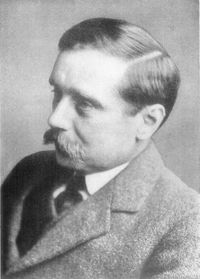H. G. WellsHerbert George Wells was born on September 21, 1866. He became one of the pioneer writers of science fiction novels including: The War of the Worlds, The Invisible Man, and The Time Machine. He wrote works in nearly every genre, including short stories and nonfiction. He was an outspoken member of the socialist party, and most of his works contain references to his political affiliation. He died on August 13, 1946 at the age of 79. |

BiographyHerbert George was the fifth and last child of Joseph Wells and Sarah Neal. The family was a part of the lower-middle-class in England. A defining incident of his young life was an accident he had in 1874 when he was seven years old. He was dropped on a tent peg at the local sports ground and was left unable to walk for a time with a broken leg. To pass the time, he started reading and soon became devoted to the other worlds and lives to which books gave him access; they also stimulated his desire to write. In 1877 another accident had affected his life. This time it had happened to his father, leaving Joseph Wells with a fractured thigh. Science became a great interest to him as he studied under T.H. Huxley in 1883 at the Imperial College. Later on in 1891 Wells married his cousin Isabel Mary Wells, but left her in 1894 for one of his students, Amy Catherine Robbins, whom he married in 1895. Wells seeked a more structured way to play war games which prompted him to write Floor Games in 1911 and followed that with Little Wars two years later. Little Wars is recognized today as the first ever recreational war-game and Wells is regarded by gamers as "the Father of Miniature Wargaming." Wells' first bestselling novel was Anticipations, which had been published in 1901. Wells also wrote several dozen short stories, the best known of which is The Country of the Blind (1911). He also wrote nonfiction. His bestselling two-volume work The Outline of History was written in 1920 and began a new era of popularized world history. Wells contemplates the ideas of nature vs. nurture and questions humanity in books like The Island of Doctor Moreau. However, not all his scientific romances ended in a happy Utopia, as the dystopia When the Sleeper Wakes shows. Wells political views were extremely Socialist, causing him to run as a Labour Party candidate for London University in 1922. Yet, his legacy will forever be remembered as one of the original writers of the science-fiction novel genre. |

